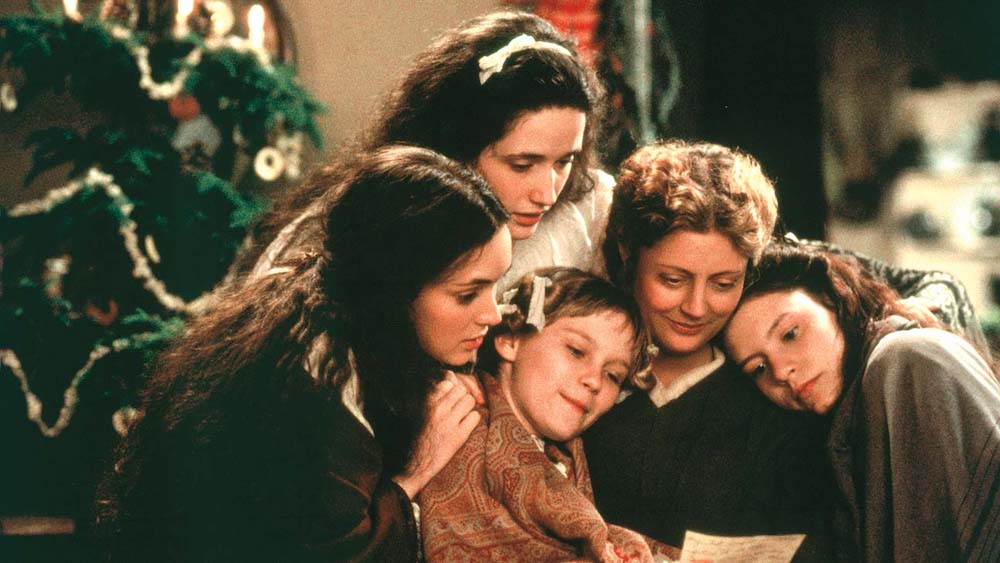This piece was published on December 26 2019 and is being republished for Women Writers Week.
“Little Women” was tailor-made to be adapted over time and evolve with generations, one of many stories that suit retelling. Think “A Star is Born” taking on new life throughout the decades with fresh eyes, tracking the pursuit of love, art and soul-draining demons until it’s nothing but an empty vessel. Or think about “Romeo + Juliet,” shining with the Baz Luhrmann decadence that places the two hyper hormonal teens in an environment that swells along with their heightened emotions. In the case of “Little Women,” while adaptations by George Cukor (1933) and Mervyn LeRoy (1949) had their fans, it’s Gillian Armstrong’s 1994 iteration that truly sunk its teeth into the story’s spirit.
Despite the many film and TV adaptations of Louisa May Alcott’s 1868 novel, and the Greta Gerwig-led picture now in theaters, the story’s enduring legacy is best celebrated in Armstrong’s capable hands. There are virtues to all adaptations, and each generation of viewers will latch on to a certain aspect or detail of whatever retelling they view first, but Armstrong captured something soul baring, wounded, intimate and heartfelt in her version. Armstrong elevated the source material while staying true to the novel it was borne from.
The resonance of Armstrong’s “Little Women” can be directly connected to her career of telling stories about intricate, imperfect, and bursting-at-the-seams-with-curiosity female characters. Armstrong’s work is versatile, moving through genre. The linking factor in all of her work being the women she’s chosen to shine a light on, the camaraderie that binds them, their pursuits of passion (whatever that might be) and the striking independence they all exude. Some are gamblers, others writers or singers, but beyond the difference of locations or time periods, it’s a baseline determined sense of self that unites them. Armstrong’s work should have resulted in a highly regarded career. Instead, she plays on the sidelines.

But given Armstrong’s history of flawed, complicated women leading her stories, it’s difficult to watch any number of her films and walk away unable to see some of the best and worst aspects of yourself reflected back. This is easily traced back to her second feature film the one which put her on the map, “My Brilliant Career” released in 1979 and starring Judy Davis and Sam Neill. In another version of “My Brilliant Career,” the lead character Sybylla (Davis) would have ended up with her childhood-friend turned potential love interest Harry (Neill). The film is fragmented by the story’s will to tell a fully-formed tale about Sybylla that goes beyond just romance, family or career to instead show her worth in how she finds herself before accepting love. The familial pressure to conform, time spent teaching the less fortunate to read and thrive with might, and Harry’s pursuit and proposals of marriage to her all lead to the film’s end. She stands in front of wild and untamed land, reading a passage from her own book, a testament to the life she lived and how she lived it. Not so much a resounding happily ever after, but it is the right one for this headstrong woman who spent so much of her life trying to find her voice, and then use it without the pressures of those around her. Like Jo, Sybylla utilizes the spirits of those near to her to distill the world without ever letting them carry her stories for her.
On the other side of strong-willed female characters looking for meaning in the arts, there’s “Starstruck”‘s Jackie (Jo Kennedy) attempting to take Sydney by storm. “Starstruck” (1982) introduces itself as one of Armstrong’s most outwardly eccentric works. A “comedy musical,” the film’s best tool is through the moments of song and dance. “Body and Soul” in particular demonstrates the radiating energy Jackie possesses, an uncompromised performer, showing us just why she deserves to be recognized. She’s a frustrating lead at times, youthfully naive and self-centered, but that’s what we want as viewers when stories about women are being told; it’s not perfection we seek, or women who were originally written as men, but complexity.
“Starstruck” is one of Armstrong’s oddities. Though there is an obvious through-line of a woman who has tunnel vision about she wants (as Jackie puts it herself, saying “I want, I want, I want” in regards to all that life offers), what she’s willing to do to obtain it and the strong willed independence that isolates her while simultaneously makes her fascinating and commendable. In speaking with the website Whimn, Armstrong addressed this line of thinking, dismissing the idea of “strong women” speaking to a moment in particular when her character in the 1987 “High Tide” was celebrated as such by critics.
“…‘Oh, your films have such strong women’ and I’d think, ‘Well, actually, they’re not strong’. In fact, “High Tide” is about a terribly bad mother who runs away. What I’m proud of though is that she’s complicated and she has these weaknesses. What we as a female audience wants are complicated women.”

This translates to any number of Armstrong’s films. “The Last Days of Chez Nous” (1992), a story of two sisters who reunite and then whose relationship combusts under one roof, is a painful story of infidelity, family, and what happens when love slowly evaporates over time. It’s also purposefully naturalistic, shot so that there’s no hint of melodrama, the scorch marks left by a harsh word made all the more painful. These are characters who make relationship-scarring mistakes but are allowed offers of redemption. Humans are fallible, prone to causing harm to ourselves and others. In her films, Armstrong asks for benevolent empathy.
“Oscar and Lucinda” and “High Tide” are similarly sympathetic to their characters, both dripping with more overt tragedy than we’re used to getting in an Armstrong picture. The former, based on the novel by Peter Carey, is a bleak romantic drama about two gamblers in pursuit of their desires and the latter about an alcoholic drifter who meets the daughter she left behind decades before.
In the 1994 adaptation of Alcott’s famous “Little Women,” Jo March reigned supreme as the gold standard of bookish girls trying to make their way through the frills and frivolities of a society that tried to contain women in neatly arranged boxes of feminine expectations. To a young girl’s eye she was admirably rough around the edges and passionate about what she wanted in life. She refused to conform to the wills of the men around her. Even amongst her sisters, especially the more societal observing Amy and Meg, she stood out rather than fit in. She was the obvious audience self-insert with a distinct voice that made her enviable and an enriching character study.

“Little Women” and how we perceive it is the combination of an empathetic script that encourages viewers to bot return to it and digest the flaws in human nature. Through the wisdom of age, Amy comes off less as Jo’s antithesis and more as her warped reflection of where she too could’ve ended up in life had she maybe fallen in a different order of lineage.
The film succeeds because Armstrong, along with screenwriter Robin Swicord, approaches every moment from all ages of womanhood—however you define it. From the wistful curiosity of childhood, easy indignation of adolescence to the empowered grasp of adulthood and beyond, the film wants every point of view to be honored. All are challenged, all are celebrated, and we grow with those perspectives. Our dynamics with the film, our opinions and how we develop them, change with the March sisters.
In Greta Gerwig’s follow up to her impressive debut “Lady Bird,” she tackles one such story with an ambitious retelling. With this story of the March sisters, Jo’s family and friends are less mere inspirations for her stories, solely being seen from her eyes as they are able to live their own independent lives. The youngest March sister, Amy (Florence Pugh), is particularly well served, a defined, full dimensional figure after only her first scene. Such rich characterization is a certain triumph for Gerwig. An enchanting adaptation, rich with emotion and fiercely protective over the characters, Gerwig’s take doesn’t so much surpass its predecessors as it offers up a twist on a classic story new fans will celebrate. Her version offers less bumps in the road, less messiness, in favor of neatly tied bows to grant each sister ample screen time. It services the characters, but doesn’t touch the emotional magnitude of Armstrong’s take.
Layered portrayals of perspective proves to be a theme that’s overarching in Armstrong’s work. She observes the universes of women conditioned to exist in tight spaces, living “small” lives but shining lights on how any life can grow to be momentous. In a particularly devastating moment in “My Brilliant Career,” Sybylla looks just off camera with a stare of stony resolve as she realizes she’s going to have to break the heart of the man she’s grown to love, telling him after he’s proposed again that she “would destroy him. And I can’t have that.”
“Maybe I’m ambitious. Selfish. But I can’t lose myself in somebody else’s life when I haven’t lived my own yet.”
It’s bittersweet but cathartic; a moment where a complicated, passionate, and infuriating woman is allowed the opportunity to choose herself. No matter the “likability” of any given character that appears in these films, they each carry within themselves a determined agency as they leave greater footsteps in their wake than what the world had accounted for.
Armstrong’s career has been a tremendous one, one that should be celebrated for its versatility and craft but also for how she championed women in the industry. Armstrong delivers on the concepts of her films in full: she’s a key supporter of Screen Australia’s Gender Matters Initiative, she sits on a panel formed by the Australian Directors Guild which oversees the “Brilliant Careers” branch, and has created industry support for female directors. Greater, too, has always been her commitment to stories about women who are unflinchingly human.
As her ink-smudged fingertips would indicate, Jo March has a galaxy worth of stories to tell, and there’s a similar urgency in Armstrong’s films, regardless of the meditative pace they strike. Armstrong deals in multitudes. Her work possesses a keen awareness not just that women are powerful protagonists but that they’re messy, too. Sometimes they’re self-destructive and almost always chasing a means to establish themselves as figures of agency. It’s the unspoken battle against outlier—of exterior judgement—that grants her work such lasting gravitas. Armstrong respects and honors every stage of her characters’ development—no matter the path it leads them down.











